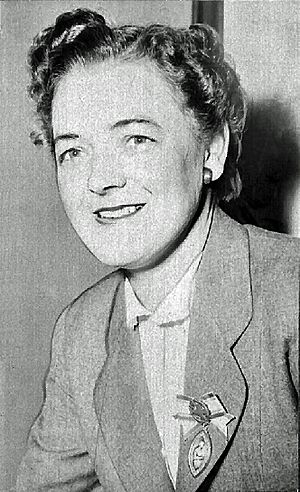Ellen Christensen facts for kids
Ellen Marie Christensen (1913–1998) was a brave Danish nurse. She became a resistance fighter during World War II, when Germany occupied Denmark. In 1953, she received a special award called the Florence Nightingale Medal. This was for her amazing work helping to save Jews, other resistance fighters, and Allied pilots during the war.
Contents
Early Life and Becoming a Nurse
Ellen Marie Christensen was born on March 30, 1913. Her family lived in a place called Frejlev, near Aalborg, in Denmark. Her father, Peter Marinus Christensen, was a farmer. Ellen grew up in a good family. After finishing school, she decided to become a nurse.
Helping the Resistance
During World War II, Germany took control of Denmark. This time was known as the German occupation. Ellen worked as a nurse at Bispebjerg Hospital. She soon joined a secret group called Frit Danmark, which means "Free Denmark". This group worked against the German occupation. Ellen helped to print and share secret newspapers and other materials.
Her work became even more important in October 1943. This was when the Germans started arresting Danish Jews. Bispebjerg Hospital became a safe place for Jewish people who were trying to escape. They stayed there until they could be secretly taken to Sweden.
Ellen was very active in this rescue work. She made many important connections with other people in the resistance movement. She not only cared for people who were hurt, but she also helped move secret weapons and explosives. She even helped get fake identity cards for people. These cards helped resistance workers stay safe and continue their important work.
Ellen worked closely with a main resistance leader named Jørgen Haagen Schmith. He was also known as Citronen, which means "the Lemon". In September 1944, Jørgen was badly hurt by the Germans. Ellen took care of him every day. But in October, the German secret police, called the Gestapo, found their hiding place. Jørgen was killed, but Ellen managed to escape. However, her identity card was found. This meant she had to hide and work in secret for the rest of the war.
After the War
After World War II ended, Ellen continued her important work. She traveled to other countries for the Red Cross. First, she worked in Greece. Later, she helped people in Israel during a conflict called the Six-Day War in 1967.
Awards and Recognition
Ellen Christensen was honored for her brave actions during the war. In 1953, she received the Florence Nightingale Medal. This award recognized her efforts in saving Jewish people, resistance fighters, and Allied pilots during the German occupation of Denmark.
 | Frances Mary Albrier |
 | Whitney Young |
 | Muhammad Ali |


